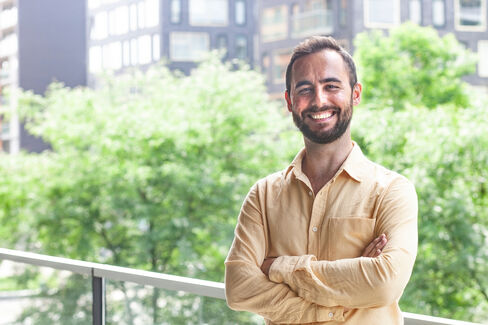3
Data-detective Álvaro Meléndez spot verdacht financieel gedrag, doordat het afwijkt van de norm. Daarmee voorkomt hij veel ellende. Maar wijken we niet allemaal wel ergens vanaf? Een openhartig gesprek over passie, inclusiviteit en tolerantie.
Bij Data Scientist denk je misschien aan eindeloze rijen cijfers op een scherm. Kortom: saai. Niets blijkt minder waar. ‘Ik kijk niet naar cijfers, maar naar het gedrag dat ze verbergen. De meeste mensen gedragen zich financieel “normaal”. Daarmee bedoel ik: volgens de norm. Stel je die norm voor als een plat vlak. Alles wat afwijkt, steekt uit en kan ik zien dankzij wiskundige modellen en fascinerende technologie als AI. Zo’n afwijkend patroon kan een onschuldig incident zijn, maar ook een symptoom van witwassen, mensenhandel of terrorismefinanciering.’
‘Rimpels aan de oppervlakte kunnen dus verdacht zijn. Die spotten, ontmaskeren en rapporteren we, zodat er kan worden ingegrepen. We zijn niet alleen de poortwachter van de bank, maar beschermen ook onze klanten – en daarmee de maatschappij. Doe ik mijn werk goed, dan draag ik bij aan een veilig en betrouwbaar bancair systeem: voorwaarde voor financiële zekerheid en economische bloei.’
Zoeken naar de mens achter het getal
‘Het klinkt misschien raar, maar mijn passie is “dingen weten”. Als kind wilde ik al elke dag iets nieuws leren, maakte niet uit wat. In mijn studies kon ik die honger naar kennis goed stillen. Tijdens mijn masteropleiding Cognitieve Wetenschappen en Kunstmatige Intelligentie leerde ik programmeren en wiskundig denken. Dat is ook echt de kern van wat mijn team heel goed kan, maar we moeten al die data óók interpreteren. Daarbij profiteer ik van mijn aanvullende graden in filosofie, psychologie en neurowetenschap. Tegelijk merk ik: hoe meer ik leer, hoe minder ik weet. Dat besef belemmert me niet, de macht van toepasbare kennis stuwt me juist vooruit. In mijn werk laat ik theoretische modellen los op abstracte informatie. Daar komt concrete kennis uit waar je iets goeds mee kunt doen. Samengevat: ik bestudeer data om een minderheid te begrijpen en zo de meerderheid te helpen.’
We worden exponentieel slimmer
‘Gaat het om geld, dan is de menselijke creativiteit grenzeloos. Financiële misdaad kent dan ook zeer veel vormen en ontwikkelt zich razendsnel. Neem grensoverschrijdende transacties, een troebel terrein en dus bij uitstek criminogeen. Maar ons team gaat minstens zo vlug. We zijn de hardst groeiende club data-experts binnen de bank, en dat zie je ook aan onze opsporingsmethoden. Dat is echt een vliegwiel: hoe meer we leren, hoe sneller en beter we onze producten fraudebestendig kunnen maken.’
Ik wil dat klanten erop kunnen vertrouwen dat het geld dat ze bij ons sparen of lenen veilig en “schoon” is. Zo draag ik bij aan de impact die ABN AMRO wil maken. Ons vak is gloednieuw, we staan pas aan het begin en er valt nog veel te leren. Maar, zoals ik al zei: dat is precies waar ik van hou, dus ik zit hier prima op mijn plek.’
Als je jezelf bent, kun je nooit ‘anders’ zijn
Goed op zijn plek zit Álvaro sinds dag één van zijn traineeship. ‘Zeker, maar ik was wel afwachtend. Ik spreek geen Nederlands, heb meer dan alleen een technische achtergrond en mijn seksuele oriëntatie is niet die van de meerderheid. Stuk voor stuk non-issues, zo bleek. Eén: de helft van alle trainees in het Data Talent Programme was buitenlands, dus iedereen communiceert met elkaar in een tweede taal. Dat offer verbindt. Twee: mijn mensgerichte extra studies zorgen voor een waardevol extra beroepsperspectief. Drie: ABN AMRO kijkt puur naar je talent, niet met wie je je vrije tijd doorbrengt.’
‘Ik ben met open armen ontvangen en heb me geen seconde buitengesloten gevoeld. Ik werk in een sociale en uitnodigende omgeving, waardoor je makkelijker meer van jezelf laat zien. Comfortabel ook, want je hoeft je niet te meten met anderen en wordt met niemand vergeleken. Weet je, we zijn allemaal wel ergens “anders” in. Ik alleen al doordat ik mijn familie en land verliet. Een keuze die óók iets over mij zegt, zoals mijn werk weer iets toevoegt aan mijn persoonlijke ontwikkeling.’
‘Naast techniek, is communicatie erg belangrijk in mijn baan. Ik moet complexe data story’s begrijpelijk maken voor mensen met verschillende achtergronden. Dat lukt niet als je het alleen over loss function en logistic regression hebt. Ik doe dat dus op mijn eigen, wat breedsprakige manier. Dat kan, omdat ik me hier veilig voel. Als je kunt zijn wie je bent, ontstaat ruimte om grenzen te verleggen: privé en in mijn vak. Het eerste is leuk, het tweede hard nodig. Want ook in DFC is er nog een wereld te winnen.’

